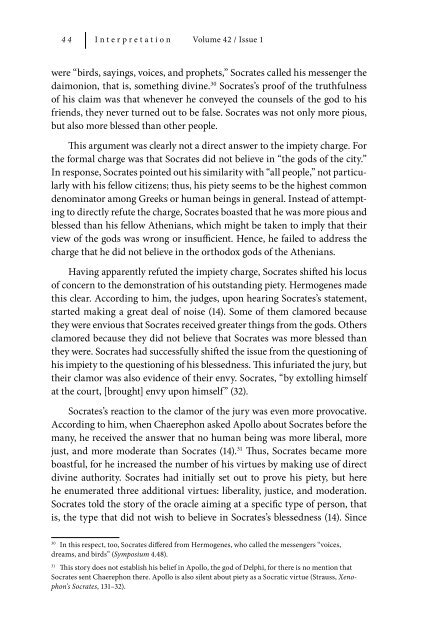Fall 2015
Vol_42_1
Vol_42_1
- No tags were found...
Create successful ePaper yourself
Turn your PDF publications into a flip-book with our unique Google optimized e-Paper software.
4 4 I n t e r p r e t a t i o n Volume 42 / Issue 1<br />
were “birds, sayings, voices, and prophets,” Socrates called his messenger the<br />
daimonion, that is, something divine. 30 Socrates’s proof of the truthfulness<br />
of his claim was that whenever he conveyed the counsels of the god to his<br />
friends, they never turned out to be false. Socrates was not only more pious,<br />
but also more blessed than other people.<br />
This argument was clearly not a direct answer to the impiety charge. For<br />
the formal charge was that Socrates did not believe in “the gods of the city.”<br />
In response, Socrates pointed out his similarity with “all people,” not particularly<br />
with his fellow citizens; thus, his piety seems to be the highest common<br />
denominator among Greeks or human beings in general. Instead of attempting<br />
to directly refute the charge, Socrates boasted that he was more pious and<br />
blessed than his fellow Athenians, which might be taken to imply that their<br />
view of the gods was wrong or insufficient. Hence, he failed to address the<br />
charge that he did not believe in the orthodox gods of the Athenians.<br />
Having apparently refuted the impiety charge, Socrates shifted his locus<br />
of concern to the demonstration of his outstanding piety. Hermogenes made<br />
this clear. According to him, the judges, upon hearing Socrates’s statement,<br />
started making a great deal of noise (14). Some of them clamored because<br />
they were envious that Socrates received greater things from the gods. Others<br />
clamored because they did not believe that Socrates was more blessed than<br />
they were. Socrates had successfully shifted the issue from the questioning of<br />
his impiety to the questioning of his blessedness. This infuriated the jury, but<br />
their clamor was also evidence of their envy. Socrates, “by extolling himself<br />
at the court, [brought] envy upon himself” (32).<br />
Socrates’s reaction to the clamor of the jury was even more provocative.<br />
According to him, when Chaerephon asked Apollo about Socrates before the<br />
many, he received the answer that no human being was more liberal, more<br />
just, and more moderate than Socrates (14). 31 Thus, Socrates became more<br />
boastful, for he increased the number of his virtues by making use of direct<br />
divine authority. Socrates had initially set out to prove his piety, but here<br />
he enumerated three additional virtues: liberality, justice, and moderation.<br />
Socrates told the story of the oracle aiming at a specific type of person, that<br />
is, the type that did not wish to believe in Socrates’s blessedness (14). Since<br />
30<br />
In this respect, too, Socrates differed from Hermogenes, who called the messengers “voices,<br />
dreams, and birds” (Symposium 4.48).<br />
31<br />
This story does not establish his belief in Apollo, the god of Delphi, for there is no mention that<br />
Socrates sent Chaerephon there. Apollo is also silent about piety as a Socratic virtue (Strauss, Xenophon’s<br />
Socrates, 131–32).


